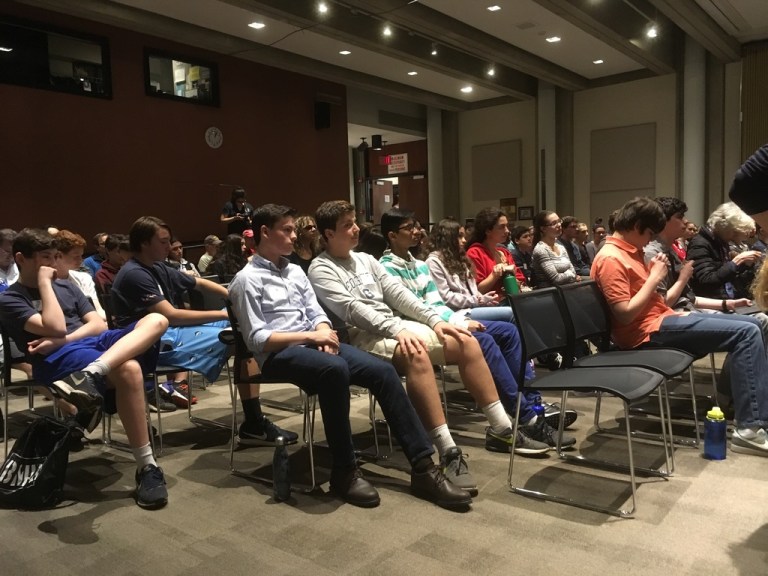
For years, John Byrne said, he thought that the effort to combat climate change would be waged on the international stage, between governments. But he said that he has changed his mind.
“Our local communities have taken up the leadership on this,” he said. “You are going to have the ability to make a change.”
That was the message that Byrne, whose contributions to the Intergovernmental Panel on Climate Change helped it win a Nobel Prize, gave to an auditorium full of local high school students. His remarks opened the inaugural Youth Climate Summit, held on Saturday at the Port Washington Public Library.
The event, organized by ResidentsForward, was intended to inspire local students to begin their own projects to combat climate change.
“For example, with food, we’re hoping that maybe they’ll try a square-foot garden at Schreiber [High School],” said Mindy Germain, the executive director of ResidentsForward.
About 100 students from Port Washington and beyond attended the climate summit.
“I’m inspired,” Germain said of the turnout. “I am so happy that our kids are so passionate about our planet.”
In his presentation, Byrne outlined how quickly cities have expanded over the last few decades to the detriment of the planet. He said that his generation has failed to protect the environment but that the students in the room could be the generation that gets it done.
“His job is to give the 1,000-foot view of climate change,” Germain said.
After Byrne’s speech, the students took turns rotating through different workshops. Among the topics were water, food, waste and possible careers that involved the environment.
Marv Makofsky of Plant a Row took part in the food workshop, discussing how growing your own produce can reduce your carbon footprint.
“This is about educating kids to be the next generation of creating solutions, to make change possible,” he said. “This next generation is going to make a big difference, and we’re here to guide them … this is really a starting point to explore these different subject matters.”
Afterward, the students filled out a worksheet where they detailed what project they want to do, what climate issue it will tackle, and what professional mentors will support them. The students will then team up for their projects, which will be overseen by the mentors — many of whom led the workshops — and ResidentsForward.
One of the students in attendance was Sean Parsons, a senior at Schreiber. Parsons is already involved with gardening — he is working on a project with the Cow Neck Historical Society to create a historically accurate garden — and hoped that other students his age would grow their own food, too.
“I am really interested in the food workshop and I think others will be,” he said.
That focus on doing something small to make a difference was echoed by Makofsky, who has worked with Parsons in the past.
“We can’t control what the government does at a national level, but we can control what goes on locally,” he said.
Germain plans to turn the summit into an annual event, one that will inspire even more students to take action.
“We hope it just keeps growing and we get more and more schools to get involved,” she said. “Our vision is that this becomes a summit for schools all over Long Island.”






